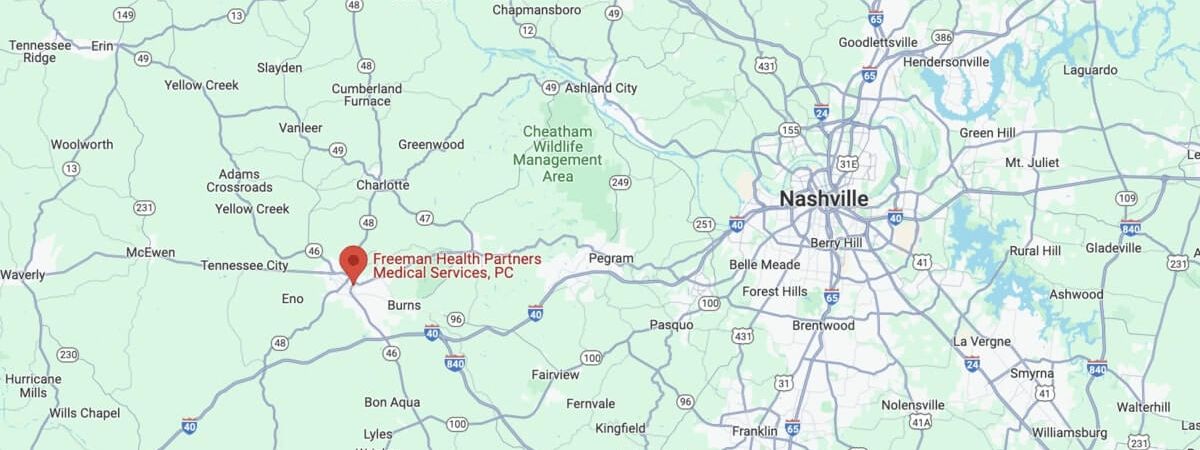Mental Health Therapy and Treatment Center Near Nashville, TN
Mental Health Therapy and Treatment Center
Near Nashville, Tennessee
Finding a trusted mental health therapy and treatment center near Nashville, Tennessee, is crucial for those seeking emotional stability and wellness. Freeman Health Partners is a leading provider in the area, offering personalized care to help you achieve mental well-being. If you’re in Middle Tennessee, look no further than Freeman Mental Health for your emotional wellness needs.
At the Freeman Mental Health Program, we treat a variety of mental health disorders, including anxiety, depression, PTSD, bipolar disorder, and more. Our experienced team provides comprehensive care to support your journey to recovery. Let’s dive into what we treat and how we can get you back on the path to recovery.

What is a Mental Health Disorder?
A mental health disorder, also known as a mental illness, is a condition that affects a person’s thinking, feeling, behavior, or mood, often leading to distress and difficulties in functioning. These disorders can range from mild to severe and may impact daily activities, relationships, and overall quality of life.
Common mental health disorders include anxiety, depression, bipolar disorder, schizophrenia, and post-traumatic stress disorder (PTSD). These conditions can stem from a combination of genetic, biological, environmental, and psychological factors. With proper diagnosis and treatment, which may include therapy, medication, and lifestyle changes, people with mental health disorders can take control of their symptoms and lead satisfying lives.
What is a Mental Health Therapy and Treatment Center in Nashville, TN?
A mental health therapy & treatment center in Nashville, TN, provides specialized services for people seeking help with mental health issues. These centers offer a range of mental health disorder treatment, including mental health counseling, therapy, and medication management, tailored to handle various mental health disorders and support overall emotional well-being.
In Nashville, one notable example is Freeman Health Partners, which offers comprehensive mental health offerings designed to support patients through personalized care plans. Our team of mental health professionals is dedicated to helping clients manage and overcome challenges related to behavioral health, providing effective treatment and support for achieving lasting wellness.
How to Find a Mental Health Treatment and Therapy Programs Near Me
To find mental health treatment and rehabilitation programs near you, there are several options. You can start by searching online directories, contacting local health providers, or asking for referrals from healthcare professionals. To go straight into personalized assistance with a local option near Nashville, call us at Freeman Mental Health at (615) 879-3582.

Mental Health Therapy and Treatment Facility in Dickson, Tennessee
In Dickson, TN, Freeman Health Partners offers mental health therapy and treatment at 222 State Street. Our facility provides comprehensive mental health services, including assessments, counseling, and therapy. Conveniently located, it serves the local community with a focus on personalized care to support emotional well-being and address various mental health concerns.
Alternative Ways to Find Anxiety Therapy and Treatment in Middle Tennessee
When searching for an anxiety therapy and treatment center in your area, it’s essential to evaluate several factors to find a solid, trustworthy program. Follow this guide to help you select the right mental health treatment center for your needs:
- Online Search: Start by searching online with terms like “anxiety therapy near me” or “mental health treatment in Nashville, Tennessee.” This will help you identify local facilities specializing in anxiety and other mental health services.
- Primary Care Physician: Consult your primary care physician, like those at Freeman Primary Care, for referrals. They can recommend reputable mental health treatment centers and specialists based on your specific needs.
- Check Accreditation: Verify that the treatment centers are accredited. Accredited centers adhere to high standards of care and ensure that they meet rigorous quality benchmarks.
- Evaluate Services Offered: Look for centers that offer a comprehensive range of services, including therapy, medication management, and support for families. This ensures a holistic approach to mental health care.
- Review Staff Qualifications: Assess the qualifications and experience of the staff. Seek licensed professionals with expertise in treating anxiety and other mental health conditions.
- Read Reviews and Testimonials: Check reviews and testimonials from previous patients. This can provide insight into the quality of care and the experiences of others who have received treatment at the center.
- Contact the Center: Reach out directly to the centers you are interested in. Many offer free consultations or initial assessments to help you understand their programs, services, and insurance options.
Free Mental Health Assessments
What Types of Therapy and Counseling Options for Mental Health Disorders are Available in Tennessee?
In the Volunteer State, various types of therapy and counseling are available. These include Medication management services, Cognitive-Behavioral Therapy (CBT), Dialectical Behavior Therapy (DBT), Group Therapy, Counseling and Talk Therapy, Family Therapy, Transcranial Magnetic Stimulation (TMS), and Eye Movement Desensitization and Reprocessing (EMDR). These examples illustrate some of the diverse options available, though they do not represent a complete list.
Medication Management Services
Medication management services include the systematic oversight of psychiatric medications to ensure their effectiveness and minimize side effects. These services include regular assessments, dosage adjustments, and monitoring for potential interactions. Aimed at optimizing treatment outcomes, medication management is crucial for people with mental health disorders who require pharmacological support as part of their overall care plan.
Cognitive-Behavioral Therapy (CBT) for Mental Health Support
Cognitive-Behavioral Therapy (CBT) for mental health support focuses on identifying and changing negative thought patterns and behaviors. This evidence-based approach helps you develop healthier ways of thinking, cope with stress, and improve emotional regulation. CBT is effective for treating various disorders, including anxiety, depression, and PTSD, by promoting practical problem-solving and behavioral change.
Dialectical Behavior Therapy (DBT) for Mental Health Treatment
Dialectical Behavior Therapy (DBT) for mental health treatment combines cognitive-behavioral techniques with mindfulness strategies to help you manage intense emotions and improve interpersonal skills. Developed to treat borderline personality disorder, DBT is effective for various conditions involving emotional dysregulation. It emphasizes acceptance, emotional regulation, and developing coping strategies to enhance overall well-being.
Group Therapy for Mental Health Treatment
Group therapy for mental health treatment involves structured sessions where people share their experiences and support each other under the guidance of a trained therapist. This approach fosters a sense of community, provides diverse perspectives, and helps people learn from others’ experiences. It is effective for building social skills, gaining insights, and receiving mutual encouragement.
Counseling and Talk Therapy
Counseling and talk therapy involve discussing personal challenges and emotions with a trained therapist, an expert who knows how to help someone with mental health disorder. This therapeutic approach helps you explore your thoughts, feelings, and behaviors, providing insight and guidance. It is effective for addressing various mental health issues, including stress, relationship problems, and emotional difficulties, encouraging personal growth and healing.
Family Therapy for Mental Health Therapy
Family therapy focuses on improving communication and resolving conflicts within the family unit. It involves all family members and addresses how their dynamics impact individual and collective well-being. This approach helps families understand each other better, strengthen relationships, and work together to support each member’s mental health and overall functioning.
Transcranial magnetic stimulation (TMS)
Transcranial Magnetic Stimulation (TMS) is a non-invasive treatment that uses magnetic fields to stimulate nerve cells in the brain. It is primarily used for people with depression who haven’t succeeded with traditional therapies. TMS can help improve mood and cognitive function by targeting specific areas of the brain, offering a promising option for managing severe symptoms.
Eye movement desensitization and reprocessing (EMDR)
Eye Movement Desensitization and Reprocessing (EMDR) is a psychotherapy approach designed to alleviate distress associated with traumatic memories. It involves guided eye movements to help reprocess and integrate traumatic experiences, reducing their emotional impact. EMDR is effective for treating PTSD and other trauma-related disorders, facilitating healing by addressing the root of distressing memories.
We Accept Most Major Insurance Providers in Tennessee
At Freeman Health Partners, we understand the financial concerns that accompany the decision to seek mental health and primary care services. That’s why we’re committed to making our services as accessible as possible by accepting most major insurance providers in Tennessee. This includes Aetna, Carelon, Blue Cross Blue Shield, Cigna, and Humana.
Our goal is to ensure that everyone who needs our help can receive it, regardless of their insurance coverage. We encourage you to take the first step towards better mental health by filling out our online form. This will allow us to determine your health insurance coverage levels for mental health and primary care services. By understanding what services your insurance covers, you can start your journey with confidence, knowing that you have the financial support you need.




Check Your Insurance By Phone
What Types of Mental Health Treatment Services are Available Near Nashville, Tennessee
Near Nashville, a variety of private mental health treatment services are available to approach different situations and needs. These include Partial Hospitalization Programs for mental health therapy, Intensive Outpatient Programs, and crisis stabilization services. Each program offers a unique approach to support you through different stages of treatment and recovery, with comprehensive care and effective support.
Partial Hospitalization Programs for Mental Health Therapy
Partial Hospitalization Programs (PHPs) for mental health therapy offer a structured treatment option for clients needing intensive support but who don’t necessarily need 24-hour care. PHPs often include daily therapy sessions, medical supervision, and skill-building activities. They help provide a high level of therapeutic care while letting patients return home in the evenings.
Intensive Outpatient Programs for Mental Health Treatment
Intensive Outpatient Programs (IOPs) for mental health outpatient treatment provide a flexible, structured approach for those needing significant support without round-the-clock hospitalization. IOPs involve regular counseling sessions, support groups counseling, and individualized care plans, typically occurring several times a week. This program allows you to maintain much of your daily schedule while receiving comprehensive mental health care.
Crisis Stabilization Services of Mental Health Needs
Crisis stabilization services handle urgent mental health needs by providing immediate, short-term support during a mental health crisis. These services include intensive supervision, stabilization therapy, and crisis intervention to ensure safety and recovery. Designed to manage acute symptoms and prevent hospitalization, they help you regain stability and transition to ongoing care.

Common Mental Health Disorders Treated at Freeman Health Partners
Common mental health disorders involve a wide range of conditions that affect mood, behavior, and thinking. Below are examples of prevalent disorders, including Major Depressive Disorder (MDD), social anxiety disorder, Generalized Anxiety Disorder (GAD), Obsessive-Compulsive Disorder (OCD), Dual Diagnosis Disorders, and Attention-Deficit/Hyperactivity Disorder (ADHD). This list is not exhaustive but highlights some of the most frequently encountered conditions.
Understanding Major Depressive Disorder (MDD)
Major Depressive Disorder (MDD) is a common mental health condition highlighted by persistent feelings of sadness, hopelessness, and a lack of interest in daily activities. People with MDD may experience changes in sleep, appetite, and energy levels. This disorder can significantly impact a person’s quality of life, but effective treatments, including therapy and medication, are available.
Exploring Social Anxiety Disorder
Social Anxiety Disorder involves an intense fear of social situations where one might be judged or embarrassed. This fear can lead to avoidance of social interactions, making everyday activities challenging. People with social anxiety disorder may experience physical symptoms like sweating, trembling, and rapid heartbeat. Treatment options, such as holistic therapy and medication, can help manage and reduce symptoms.
Generalized Anxiety Disorder (GAD) Overview
Generalized Anxiety Disorder (GAD) involves excessive, uncontrollable worry about various aspects of daily life, such as health, work, or relationships. This persistent anxiety often leads to physical symptoms like restlessness, fatigue, and difficulty concentrating. GAD can interfere with daily functioning, but with proper treatment, including therapy and medication, people can manage their symptoms successfully.
Insights into Obsessive-Compulsive Disorder (OCD)
Obsessive-Compulsive Disorder (OCD) is a mental health condition marked by unwanted, intrusive thoughts (obsessions) and repetitive behaviors or rituals (compulsions) aimed at reducing anxiety. These behaviors can become time-consuming and interfere with daily life. OCD is treatable through therapy, particularly cognitive-behavioral therapy (CBT), and medication, helping you manage symptoms and improve your quality of life.
Navigating Dual Diagnosis Disorders
Dual Diagnosis Disorders refer to the co-occurrence of a mental health disorder and a substance use disorder. People facing dual diagnoses may struggle with conditions like depression or anxiety alongside addiction to drugs or alcohol. Psychiatric treatment for dual diagnosis requires an integrated approach, addressing both mental health and substance use simultaneously for effective recovery and long-term psychological wellness.
Attention-Deficit/Hyperactivity Disorder (ADHD) Explained
Attention-Deficit/Hyperactivity Disorder (ADHD) is a neurodevelopmental disorder with symptoms of inattention, hyperactivity, and impulsivity. These symptoms can impact daily functioning, affecting academic, occupational, and social life. ADHD is often diagnosed in childhood but can persist into adulthood. Treatment typically involves a combination of behavioral therapy and medication to help manage symptoms and improve focus and self-control.

How Much Do Mental Health Disorder Services Cost Near Me in Middle Tennessee?
The cost of mental health therapy and services in Middle Tennessee can vary widely depending on the type of service and provider. On average, therapy sessions range from $100 to $200 per session, while psychiatric evaluations and medication management can cost between $150 and $300.
Additional factors affecting cost include the provider’s experience, the complexity of the case, and whether the provider is in-network with your insurance plan. Some services may be offered on a sliding scale based on income, and many insurance plans provide partial coverage, which can help reduce out-of-pocket expenses.
How to Check if My Health Insurance Plans Offer Payment Coverage for Mental Health Services Near Nashville?
To determine if your health insurance plan offers payment coverage for mental health services near Nashville, review your policy details with the expert team at Freeman Health Partners in Dickson. Coverage typically includes therapy, counseling, and psychiatric services, but specifics can vary.
For personalized assistance, call (615) 879-3582 or visit our contact page at Freeman Health Partners. Our team can help you navigate your insurance benefits and find the coverage you need.
Does Private Health Insurance Cover Mental Health and Chronic Disease Treatment in Tennessee?
Yes, private health insurance in Tennessee generally covers mental health and chronic disease treatment in Nashville, though specifics can vary by plan. Coverage typically includes various services such as therapy sessions, medication management, and chronic disease management programs. It is essential to review your individual policy details to understand the extent of coverage and any associated costs.
Most private insurance plans follow guidelines established by the Affordable Care Act, which mandates mental health and substance use disorder parity, meaning these services are covered similarly to physical health treatments. For chronic disease care, coverage often includes outpatient and inpatient offerings, but it’s important to verify which treatments and providers are covered to avoid unexpected expenses.
Which Health Insurance Providers Cover Mental Health Treatment and Chronic Disease Management?
Several major health insurance providers offer coverage for mental health treatment and chronic disease management. Prominent insurers include BlueCross BlueShield, which provides comprehensive mental health and chronic disease management coverage, including therapy and medication. UnitedHealthcare offers extensive services for mental health and chronic conditions across various plans. Cigna covers treatments and support options for mental health and chronic diseases.
Other notable providers include Aetna, which includes mental health and chronic disease management in its health plans, and Humana, offering coverage for both conditions, including counseling and medication, mental health education, and mental health advocacy.. It’s important to review your plan details with us at Freeman Health Partners to understand specific coverage, benefits, and any associated costs.
What Are Signs and Symptoms of Mental Health Disorders?
Signs and symptoms of mental health disorder can vary widely, depending on the specific condition and the individual. However, certain patterns of behavior, thoughts, and emotions may signal that someone is struggling with their mental health. Timely mental health intervention can make a significant difference in managing the disorder and improving the person’s quality of life.
Common signs of mental health disorder include persistent feelings of sadness or hopelessness, excessive worry or fear, and significant changes in mood, behavior, or personality. People may also experience difficulty concentrating, withdrawing from social interactions, or losing interest in activities they once enjoyed. Physical symptoms, such as unexplained aches, fatigue, or changes in appetite and sleep patterns, can also indicate an underlying mental health issue.
Here are some specific signs to watch for:
- Persistent sadness, tearfulness, or irritability
- Intense anxiety, panic attacks, or constant worry
- Withdrawal from friends, family, and activities
- Changes in sleep patterns, such as insomnia or excessive sleeping
- Significant weight loss or gain, changes in appetite
- Difficulty concentrating, making decisions, or remembering things
- Extreme mood swings, from high energy to deep depression
- Substance abuse as a way to cope with emotions
- Feelings of worthlessness, guilt, or hopelessness
- Thoughts of self-harm or suicide
If you or someone you know is experiencing these symptoms, it’s crucial to seek professional help. Early diagnosis and treatment can lead to better outcomes and a path toward mental health recovery. The experts at Freeman Mental Health can help with mental health resources: contact us today.

Are There Free and Confidential Mental Health Assessments in Nashville, Tennessee?
Yes, there are free and confidential mental health assessments available in Nashville, Tennessee. Freeman Health Partners (FHP) offers these assessments at no cost, providing you with a private and supportive environment to evaluate your mental health needs. This service is designed to help those seeking guidance and support without financial barriers.
These free assessments at FHP allow for a comprehensive evaluation of mental health concerns, helping you receive appropriate recommendations and referrals for further treatment if needed. The confidentiality of these assessments ensures that personal information is protected, inspiring a safe space for discussing mental health issues and exploring potential paths to recovery.
Does Private Health Insurance Cover Mental Health Therapy and Treatment in Tennessee?
Yes, private health insurance typically covers mental health disorder therapy and treatment in Tennessee. Most plans provide coverage for various mental health offerings, including therapy sessions, counseling, and medication management. Coverage details can vary by plan, so it’s important to check specific benefits and network providers like Freeman Mental Health to understand the extent of coverage and any associated costs.
To ensure you receive the maximum benefits, contact us at Freeman Health Partners for information on mental health coverage. Understanding your plan’s provisions, including co-pays, deductibles, and limits, will help you make informed decisions about accessing mental health care and managing any potential out-of-pocket expenses.
Which Health Insurance Providers Have Plans to Cover Mental Health Treatment?
Several major health insurance providers offer plans that cover mental health and medical treatment. Prominent brands include Blue Cross Blue Shield, UnitedHealthcare, Cigna, Aetna, Humana, and others. These providers typically offer comprehensive mental health coverage, including therapy sessions, counseling, and medication management, as part of their health insurance plans.
To ensure you have the appropriate coverage, it’s important to review each provider’s specific plans and benefits. Understanding the details of your plan, including in-network and out-of-network options, co-pays, and coverage limits, will help you access the mental health care you need while managing costs effe
How Much Does Mental Health Therapy and Treatment Cost in Nashville, Tennessee?
The cost of mental health therapy and treatment in Nashville, Tennessee, varies depending on the type of service and provider. Generally, therapy sessions range from $100 to $250 per hour, while more intensive treatments or programs may cost more. Insurance coverage and sliding scale fees can affect out-of-pocket expenses.
To get an accurate estimate, it’s essential to check with specific providers like Freeman Health Partners about their rates and any available financial assistance. Many facilities offer payment plans or sliding scale fees based on income, and insurance plans may cover a portion of the costs. Contacting us at Freeman Mental Health will give you a clearer picture of potential costs and financial options.

What is the Program Admissions Process for Mental Health Treatment at Freeman Health Partners?
The admissions process for mental health treatment programs aims to provide suitable care and support for patients dealing with mental health or substance use issues. Though each treatment center may have its own specific procedures, here’s a broad outline of what you can generally anticipate:
- Initial Contact: To start the admissions process at Freeman Health Partners, you’ll first need to reach out to the center. This can be done by calling our office at (615) 879-3582, filling out our contact form, or visiting in person at 222 State Street, Dickson, TN 37055. During this initial contact, you’ll provide basic information about your needs and schedule an initial consultation.
- Assessment and Evaluation: Once you’ve made contact, you’ll undergo a comprehensive assessment and evaluation. This step involves discussing your mental health history, current concerns, and any relevant medical information. The goal is to understand your specific needs and determine the most appropriate treatment options.
- Insurance Verification and Coverage: After the assessment, the next step is verifying your insurance coverage. Freeman Health Partners will check your insurance details to confirm what services are covered and any associated costs with treatment. They will help you understand your benefits and any potential out-of-pocket expenses.
- Treatment Plan Development: Based on the assessment, a personalized treatment plan will be developed. This plan outlines the goals of your therapy, the types of treatments you will receive, and the frequency of sessions. It’s customized to address your specific mental health needs and ensure effective care.
- Admissions Coordination: The admissions team will coordinate the details of your entry into the program. This includes scheduling your start date, organizing any necessary paperwork, and ensuring that you have all the information you need to begin treatment.
- Orientation and Program Introduction: Upon admission, you will participate in an orientation session. This introduction provides an overview of the program, including its structure, rules, and what to expect. It helps you become familiar with the facility and the treatment process.
- Active Participation in Treatment: As you begin your treatment plans, active participation is crucial. Engage in scheduled therapy sessions, follow your treatment plan, and communicate openly with your care team. Your involvement plays a key role in your progress and recovery.
- Progress Monitoring and Adjustments: Throughout your treatment, your progress will be regularly monitored. The care team will assess how well you’re responding to the program and make any necessary adjustments to your treatment plan. This guarantees that the care you receive remains effective and tailored to your evolving needs.
Check Your Insurance Coverage
Find out your health insurance coverage levels for by calling the number below.
- A&D Assessments Nashville, TN
- CBT Therapy Nashville
- Dialectical Behavioral Therapy TN
- Nashville Family Therapy Program
- Medication Assisted Treatment (MAT)
- Medication Management Nashville
- Programs for Mental Health Treatment
- Mental Health Intervention
- Mental Health Outpatient Program
- PHP Adolescent Program
- Primary Healthcare Clinician TN
- Private Mental Health Treatment
- Psychiatric Services Nashville
- Residential Treatment Tennessee
- Mental Health Therapy & Counseling
- TMS Therapy Nashville, TN
- EMDR Therapy Nashville, TN
- Addiction Counseling Program
- ADHD Therapy Nashville
- Anxiety Treatment Nashville
- Avoidant Personality Disorder Treatment
- Treatment for Bipolar Disorder
- Borderline Personality Disorder
- Chronic Disease Management Nashville
- Treatment for Dependent Disorder
- Depression Treatment Nashville
- Treatment Plan for Dissociative Identity
- Anxiety Treatment Nashville
- Histrionic Personality Disorder Treatment
- Treatment for Mental Health Disorders
- Narcissistic Personality Disorder
- Treatment for OCD Nashville
- Paranoid Personality Disorder Services
- Personality Disorder Treatment Nashville
- Pregnancy Wellness Services Nashville
- PTSD Treatment in Tennessee
- Schizoaffective Disorder Treatment
- Schizoid Personality Disorder Treatment
- Schizotypal Personality Disorder Treatment
- Self Harm Therapy and Treatment
- Insomnia Sleep Disorder Treatment
- Therapy for Suicidal Thoughts
Statistics and Information on Mental Health Services in Middle Tennessee
- In the U.S., an average of 28.2% of adults with anxiety or depression needed counseling or therapy but did not receive it: in Tennessee, that number was 28.7%
- 230,000 adults had thoughts of suicide in the last year in TN
- In Tennessee, 20% of children have a mental health disorder
- Davidson County residents reported having 3 poor mental health days involving stress, depression, and problems with emotions in a 30-day period
- 91.7% of TN mental health service participants were satisfied with their care

